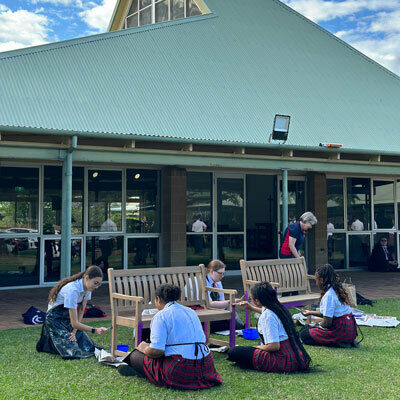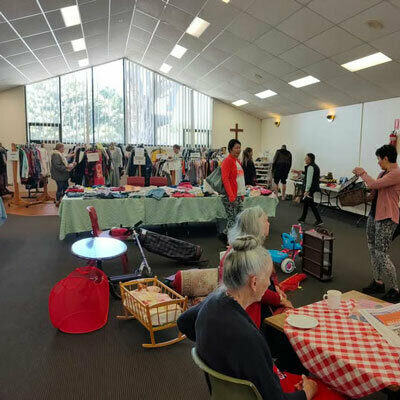A New World of Ministry
The Ven Justine Coverdale, Acting Archdeacon of Perth and Archbishop’s Registrar
A snapshot of activities from around the Diocese reveals the myriad faces Anglican ministry.
Warm inside the Holy Grounds café adjacent to St George’s Cathedral, volunteers are brewing coffee for the knitting group.
In the silence and growing darkness, worshippers at St Cuthbert’s are observing Earth Hour and praying for creation.
In the chapel garden of an Anglican school in Kelmscott, teenagers are painting purple benches to raise awareness of family and domestic violence.
On the road from Guildford to Bassendean, children and their teachers are walking with their bishop on a Pilgrimage of Hope.
In the primary school carpark, the Kalamunda parish priest is serving democracy sausages to the locals who have come to vote.
Early in the morning at Floreat the parishioners at St Nicholas’ Church are busy sorting donations to sell at their Op Shop.




At its core, ministry is about proclaiming the good news of Jesus Christ through worship, discipleship and service. From the very beginning in Luke 10 when Jesus sent out his disciples into the villages to preach the Kingdom of God, heal the sick and prepare the way, his followers were dependent on the Holy Spirit and their own ingenuity. Building relationships, teaching and serving people in local communities was how the disciples became trusted and successful in spreading the message of Jesus.
In Australia today most people do not attend church. Indeed, fewer people each year identify as Christian. In 2021, 44 percent of people in Australia identified as Christian, down from 61 percent in 2011. Even in Anglican schools, most students come from non-Christian families and for many school chapel services are their first and only experience of Christian worship. Nevertheless, lots of young people have a keen sense of spirituality, a concern for social justice and a willingness to volunteer to help people in need. This is evidenced by the tremendous turn-out at the Anglicare School Sleepout each year, and the involvement of so many students in fundraising and service-learning projects at school and within their local community. Young people are looking for many of the things that their local Anglican church has to offer but few of them will walk through the door uninvited.
Research from the National Church Life Survey reveals the top three reasons for newcomers to Church are: because they have a sense that something is missing in their life; they have moved to a new area; and they are invited by someone they know. Relatively few have a conversion experience, with many more coming to faith through a gradual process of attending church activities and getting to know people.
The challenge for Christian ministry in this context is to go beyond the traditional church model, established in the colonial and industrial eras when church attendance was the norm, and find innovative ways to connect with people of all ages who do not attend church. Our snapshot of activities happening around the Diocese, reveals how Anglican clergy, lay leaders and parishioners are doing just that. Their activities are visible, engaging, and invitational. Often, they offer a service that meets a need in the community or raises awareness of a social justice issue.
Being present in the neighbourhood and attending local events puts the parish in the picture. A priest in a clerical collar selling democracy sausages at an electoral station or inviting hikers to finish the Bibbulmun Track by lighting a candle at the nearby Anglican Church – meets people where they are, affirms what they value and invites them into something deeper. On a practical level, like the annual parish fair, Christmas carols or monthly Op Shop open day, these activities show passersby the church is open and they are welcome.
Cafes, Op Shops, book clubs, English language classes and playgroups are familiar ways of inviting people of all ages into the church by offering a local venue for bringing people together. Particularly for people who are new to the area, lonely or isolated, these initiatives provide a place to go to meet friendly people and share experiences. Again, ministry is about building relationships and being of service.
Organising events that draw people into the life of the church is essential to modern ministry. The Hope25 project spurred many parishes, schools and agencies to be creative and hold open days and special events in their community. A standout event was the pilgrimage led by Bishop Hans Christiansen from Guildford Grammar School to St George’s Cathedral, which drew hundreds of children and adults to engage in an age-old Christian tradition. Walking along the road together gave the new pilgrims an opportunity to share their stories and talk about their faith with friends and strangers.
Like the first disciples sent out by Jesus, we are called to proclaim the Kingdom of God and share the gospel, trusting in the Holy Spirit and using our own ingenuity. The first step in effective ministry is beyond the church door and into the local community.